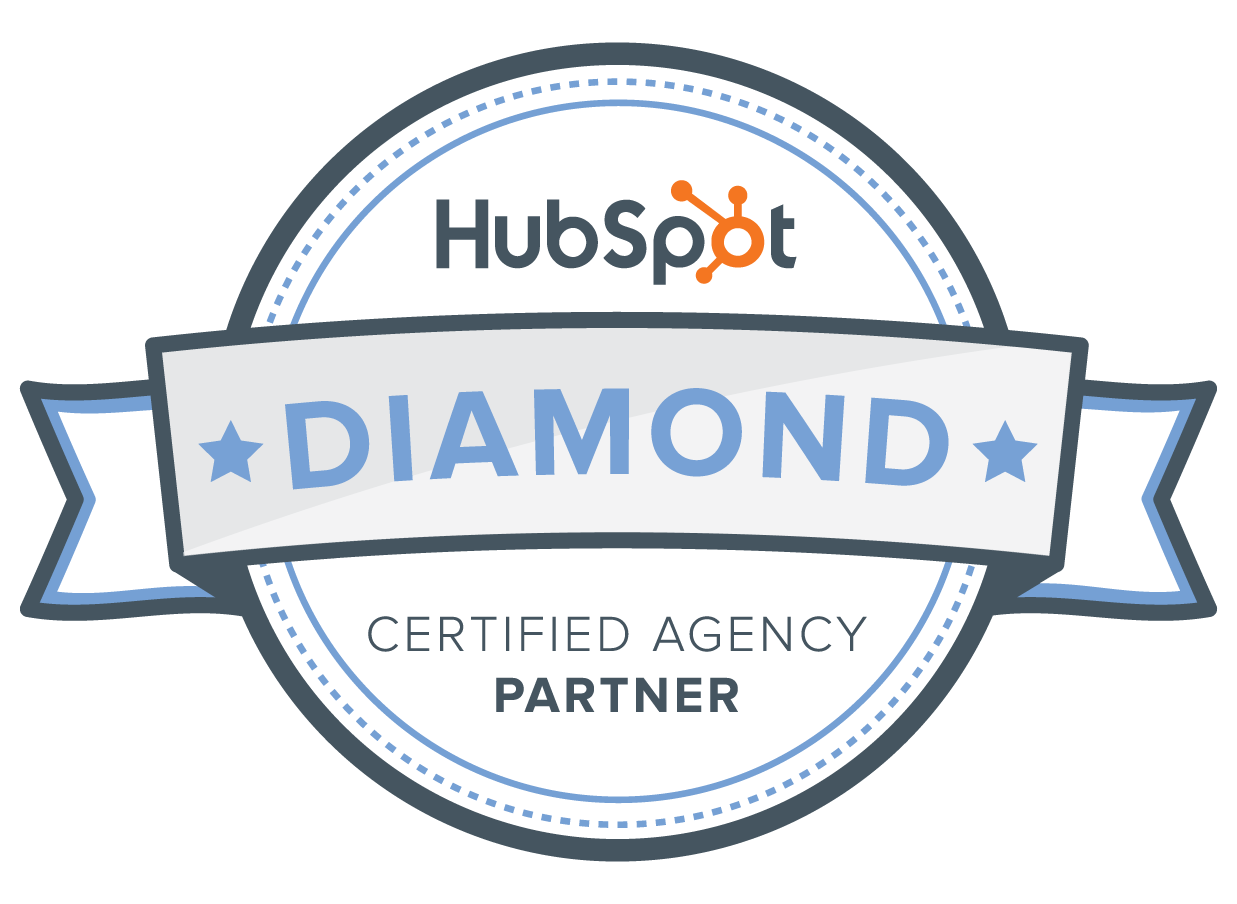Content has the power to drive your business forward in a number of ways. Increased traffic, more leads, better branding... and those beneefits are just the tip of the iceberg.
But content success doesn't just happen on a whim. At the core of success is a very deliberate, strategic approach. In other words, a content strategy framework. Let's dig in and explore what that means and why it's so critical for your B2B company.
What is a content strategy framework?
A content strategy framework is a structured approach to planning, creating, and distributing content that supports your marketing and overall business objectives. A well-designed content framework can help ensure that your content is aligned with your target audience's needs and preferences, your brand's messaging, and your business goals.
For many B2B companies, your content strategy framework will be designed to draw more qualified organic traffic to your website and convert more leads.
As you may have guessed, without a content framework, your content efforts may lack direction and focus. Sometimes, as business leaders, we think we know what our target audience wants to read and how they’re searching. In reality, our perceptions of how our ideal customers are searching are not aligned with the data.
Despite the fact that many B2B businesses are aware of the importance of building a content strategy framework, only about 40% of them have a documented content strategy.
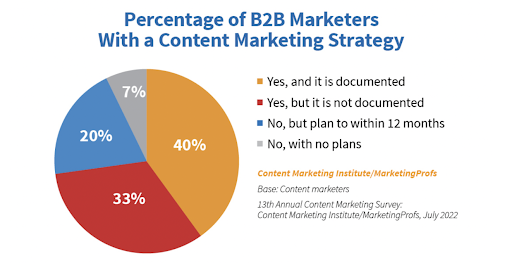
In this article, we’ll help you understand the elements of a content strategy framework, why it's critical to business success, and some of the common pitfalls that cause your content to fail.
Let’s dive in!
What are the elements of a content strategy framework?
Your content strategy framework may look slightly different depending on your unique goals and success metrics. But, in general, your content framework will include your business goals, buyer personas, brand messaging, competitive analysis, keyword research, and more.
Let’s cover some of the most important aspects of your content strategy framework:
1. Define your business goals
But wait - aren’t marketing goals separate from business goals? Many B2B marketing heads think so! That’s why before we begin client engagements, we spend an ample amount of time trying to uncover the metrics that matter most to the business. Is your primary goal to drive more traffic? Do you need to increase sales qualified leads by 25% this year? Do you need to close 5 new enterprise customers?
Before you can determine which content will perform best, you need to make sure that each piece of content you create is focused on that business goal.
2. Develop your buyer personas
Yes, it may seem insanely foundational to invest the time and effort to create a “C-Suite Sally” buyer persona. But we cannot stress the importance of buyer research enough. When you take the time to identify your target audience and understand their needs, you are one step closer to the data you need to tailor your content to that audience segment.
Your buyer persona profile can help you identify pain points, discover how they research for solutions, determine their process for making buying decisions, and uncover the content that they find most valuable. Head on over to our down and dirty buyer persona guide to learn more.
3. Create your brand messaging
What are your key messages? How do you describe your product or solution? What’s your elevator pitch? What are your key differentiators? Your brand messaging is a critical element to your content framework for a number of reasons. By ensuring that your content aligns with your brand's messaging, and that each piece of content is aligned with your business voice, you can start to build trust with your target audience over time.
4. Understand your competitor’s content
No strategic direction is complete without a good, hard look at what your direct and indirect business competitors are doing. Your competitors can be a wealth of information for your business - especially if you’re just starting out on your content journey.
Competitive audits can help you determine:
- What’s working well for your competitors online?
- Where are their biggest gaps?
- How does their messaging differ from your own?
- How can you tailor your content so that you stand out among the crowd?
5. Complete comprehensive keyword research
Keyword research is another imperative foundational element to your strategy framework. No matter how well you think you know your audience, your keyword research is the key (get it?) to drawing new and qualified visitors to your site.
When researching keywords for your content, there are three key metrics to prioritize:
- Monthly search volume: how many people are typing this exact phrase or term into Google per month
- Difficulty metric: how hard would it be to rank for this keyword?
- Intent: what is the individual’s intent when they are searching for information?
6. Map out your content types and distribution channels
Content is a pretty generic word for a much larger marketing push. Before you dive into your strategy, what are the content types you want to prioritize? Will you be publishing highly-researched whitepapers for your highly-analytical audience? Or will you be making influencer-centric TikToks to reach your core audience?
By outlining your content types and distribution channels you can start to create an editorial calendar that prioritizes the areas where your buyers are most likely to consume content.
7. Have a platform in place to measure success
No content framework is complete without attribution reporting. The content you produce should be directly tied back to your business metrics. Depending on the types of content you’re creating, your analytics tools may be stacked or fully integrated. But either way, you need to move beyond views and likes to determine the content that’s most responsible for meeting those business goals you defined earlier.
What are the benefits of a content strategy framework?
There are a number of benefits to investing time, money, and resources to creating a content strategy framework. These can include:
1. Increased website traffic and optimization
High-quality content that is optimized for search can help increase qualified site traffic and improve your SERP rankings. When your content is data-driven, keyword- and topic-centric, and part of a larger content direction, you are likely to see those results in your traffic reports.
Improved organic presence makes it much easier for you to be discovered by potential customers who are searching for solutions to their problems.
2. Increased brand awareness and thought leadership:
Your content strategy framework isn’t just great for driving traffic. Over time, strategic content that is well-researched and tailored to your buyer persona’s needs can help to position your brand as a thought leader in your industry.
Thought leadership is so much more than brand recognition. (Although, you should expect to see an increase in brand awareness with a great content strategy.) But the most important part about your thought leadership efforts is how it builds trust with your potential buyers and current customers. That’s because your content doesn’t have to be just copy. Everything you produce can be an extension of your sales, service, and marketing teams.
3. More qualified leads and customers
A strategic content marketing approach can help you to attract and engage potential customers no matter where they consume their content. Your framework can help to provide prospects with information that addresses their pain points and challenges. This can help move them along your sales flywheel: from awareness, to consideration, to purchase.
But that’s not all! Your content strategy can also make sure your current customers stick around by proactively addressing their needs for education, implementation, and service. Improved customer retention and cross-selling are inherent benefits to your content strategy.
6 Reasons Why Content Marketing Fails Without a Strategic Framework
There are a number of reasons why your content marketing efforts might fail.
In fact, according to a study by the Content Marketing Institute, only 29% of businesses to be 29% say they consider their organizations extremely or very successful with content marketing.
With that in mind, here are some of the top reasons why your content marketing efforts might fail without a strategic framework:
1. You don’t have buy-in from executives
It’s a tale as old as time. Despite overwhelming evidence to support content framework development, many legacy leaders struggle to understand the value behind investing in a content marketing strategy.
When you don’t have buy-in, you don’t get sell-in. And that lack of investment contributes to many of the common issues that content marketers face, like these barriers from the Content Marketing Institute Report:
- More budget and additional staff
- More access to subject matter experts
- Better technology
- Better measurement
- Greater alignment between marketing and sales
2. You don’t know who you’re writing for
When you’re creating content but it’s not getting traction, your first question should be: Are we talking to the right audience in the right places?
That’s why buyer persona research is imperative to your success. When marketing is siloed from sales, service, and the c-suite, you might have different ideas about what your ideal buyer’s pain points are.
In fact, 61% of content marketers say that creating content that appeals to their ideal audience at different stages of the buyer’s journey is one of their biggest challenges. And aligning that content with sales and marketing is a close second at 50%. That leads us to our next point.
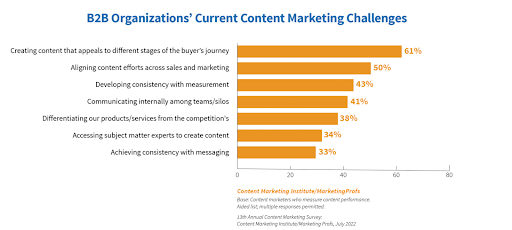
3. You’re focusing too much on the top of the funnel
Demand generation had many marketers scrambling to get more and more traffic and more and more leads.
But that may not be the best long-term approach to your content framework.
According to a 2022 Demand Gen Survey, only 8% of participants found value in their late-stage (evaluation/purchase) content marketing. Yikes!
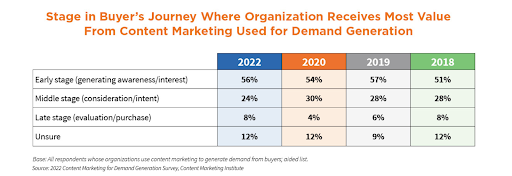
4. You don’t have access to the right tools
We’re not just talking about social media platforms and blogs.
There are an enormous amount of tools and technologies that businesses can (and should) incorporate as part of their content framework. 84% of B2B businesses say they use analytics tools to measure the success of their content efforts. But only 65% are using a content calendar or collaborative workflow to make sure content is published regularly.
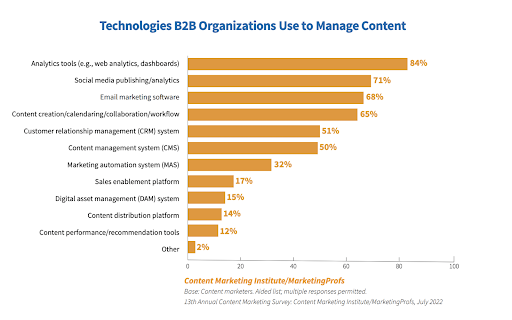
While not every business needs every single toolset to be successful, tying your content back to your business goals can only be done with the right reporting technology in place.
5. You treat content like a project
All too often, we see content marketing efforts happening in fits and starts. We call this the project approach. When businesses have a bit of free budget, content tends to get the investment it deserves.
But other times, businesses view their content strategy as a one-and-done project.
Not only can a stagnant content strategy lead to cruft and actually harm your site’s performance, but historical content optimization represents one of the strongest opportunities for business to see improved traffic with minimal effort.
While it may be tempting to publish articles and never review them again, your content framework should also solve for historical content at regular intervals. This should include:
- Minimally, an annual performance audit which identifies content pieces that are highly underperforming (or potentially harming your site’s performance)
- Regular re-optimization of core content
- Content mapping against the customer buyer’s journey (to make sure your content efforts are balanced)
- Content syndication and scaling opportunities
Content strategy is never a one-and-done effort. You should be constantly reviewing, revising, and republishing your content at regular intervals to see the most value from your investments.
6. Your content team is too small
Content takes a team. But despite that, 46% of businesses say that a single person is responsible for handling ALL types of content in their organization - this includes article content, SEO, social media, thought leadership and more.
Even small businesses need to prioritize content strategy as a micro-department of their organization. When strategists are bogged down with content creation, it’s nearly impossible for them to keep the framework on track.
That’s why more and more B2B businesses are starting to outsource elements of their content creation to strategic agencies. In fact, 47% of businesses planned to hire a content producer in 2023 to help create and scale their content. 25% of those businesses said they planned to outsource the strategic direction.
Businesses that invest in building a content strategy team are better positioned to compete not only with their human competitors but the emergence of powerful AI content creation as well.
When should you outsource your B2B content strategy?
If you’re feeling overwhelmed by the amount of strategy and creation that content brings to your team, you’re not alone.
For more than 20 years, Precision Marketing Group has helped B2B businesses design, develop, and deploy highly-effective content marketing strategies.
The best part is? We’ve worked with your industry before. So we already know what content works, where your core buyers are, and how to scale your content efforts so you get more bang for your buck.
And while content farms may promise you #1 SERP placement, there is no substitution for a data-driven strategy. Whether you’re just starting on your content journey or your blog has thousands of published articles, we’ve helped businesses just like yours attract, convert, and close new customers with creative content.
Nearly half of the businesses surveyed planned to outsource some or all of their content marketing efforts in 2023.
Before you hire a B2B marketing agency for your content, make sure they can easily answer the following questions:
- What experience do you have in developing content strategy frameworks for B2B businesses? What about for my specific industry?
- How do you approach content strategy development? What steps do you take to ensure that the strategy aligns with our business objectives and target audience?
- What types of content do you recommend for B2B businesses? Why? How do you determine which types will be most effective for our target audience?
- How do you ensure that the content aligns with our brand messaging and voice?
- How do you measure the effectiveness of the content you create? What metrics do you use to track its performance?
- How do you stay up-to-date with the latest trends and best practices in content marketing? What resources do you rely on for industry insights?
- How is your team using AI to support your content strategy?
- Can you provide case studies and examples of successful content strategy frameworks that you have developed for other B2B businesses in my industry?
- What is your process for collaborating with our team to ensure that the content strategy aligns with our goals and preferences?
- How do you optimize the content for search engines and ensure that it is easily discoverable by our target audience?
- What is your process for revising and refining the content strategy over time, and how do you ensure that it remains relevant and effective?
Ready to get started on your content strategy framework? Contact us today!












